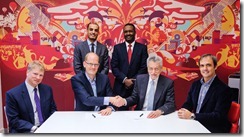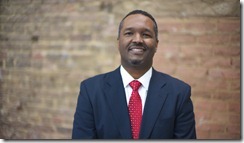In the middle of March, Virgin Mobile Middle East and Africa (VMMEA) announced that Gulf Investment Corporation (GIC) had agreed to invest US$50 million in the mobile virtual network operator (MVNO); effectively marking VMMEA’s fourth round of funding since establishment in 2007. Comm. spoke to VMMEA founder and CEO Mikkel Vinter and GIC’s Mohamed Eissa about what use the funds would be put to, and what opportunities lie ahead for this business type in the region
Photo from the signing ceremony at the Virgin Group headquarter in London, sitting down form left-to-right: Peter Langkilde (chairman, VMMEA), Mikkel Vinter (CEO and Founder, VMMEA), Shafic Ali (director Principal Investment, GIC) and Peter Stephens (partner and global head for Telecom and Media Investments, Virgin Group). Standing up form left-to-right: Fahad Al-Nusef (vice-president for Technology and Telecom Investments, GIC) and Mohamed Eissa (head of Technology and Telecom Investments, GIC)
In a little over five years of operation VMMEA (formerly Friendi Group) has developed to become the pre-eminent MVNO in the Middle East and Africa. Having already secured presence in one of the most sophisticated and significant telecom markets in Africa – South Africa – VMMEA is on track to do similarly in the Middle East, with a desire to be identified as one of three MVNOs to be licensed in Saudi Arabia later this year.
Securing its latest round of funding – US$50 million from Kuwait-based GIC – provides VMMEA with the firepower necessary to develop its presence in Saudi Arabia and other large markets in the region it has aspirations to enter.
Securing investment from GIC is not only important to VMMEA because of the size of the outlay and the timing of it, but also because it lends additional credibility to the MVNO’s business case across the region. MVNOs in this part of the world have not always made easy bed fellows for incumbent network operators, but with Saudi Arabia on the brink of offering such concessions, are likely to see accelerated acceptance and uptake.
“There were a number of factors we considered when deciding to partner with VMMEA,” said Mohamed Eissa, GIC’s head of Technology and Telecom Investments. “VMMEA’s track record in the region was a key consideration, as was our belief that MVNOs make sense for the Middle East and Africa. The company’s brand name was another compelling factor, together with our confidence that VMMEA would continue being able to form rewarding partnerships with operators.”
GIC is a unique financial institution equally and wholly owned by the six Gulf Cooperation Council (GCC) countries. Its telecom portfolio extends to a 20 per cent stake in Wataniya Telecom in Algeria, a majority stake in Tawasal Telecom, a pan-GCC MPLS network carrier’s carrier; and in submarine cable facilities in the Gulf.
Virgin Group, which in June 2012 announced a cash and shares buy-in to what was formerly Friendi Group, and later became VMMEA, and GIC have become the two largest single shareholders in the MVNO, which boasts impressive global and regional backing including from ePlanet Capital, Dolphin International, National Technology Enterprises Company (NTEC) of Kuwait, and Millennium Private Equity.
Eissa emphasised GIC’s interest in investments that have a pan-regional element to them, with a view to seeing such projects grow profitably over time.
“The tech industry in the region has the potential to have an enormous impact on the rest of the economy, and valuable applications and services are being developed and delivered,” Eissa said. “Regulators are now looking at MVNOs as a means to further improve telecom services to end-users and market liberalisation is taking place. As the mobile industry in the region has matured, there is a clear value proposition that MVNOs offer to network operators towards their attempts to rationalise costs and allocate marketing dollars. So we think this is an opportune time to be part of these exciting developments.”
Mohamed Eissa says VMMEA’s track record in the region was a key consideration in GIC’s investment in the company
While most of VMMEA’s current focus is on successfully applying for a licence in Saudi Arabia, Mikkel Vinter says a number of other markets in Middle East and Africa are also being monitored and considered for possible entry.
“With the backing of sizeable investors such as GIC, Virgin Group, and the others we have assembled, we possess the necessary firepower to consider larger markets, and this is precisely what we are in the process of doing,” Vinter told Comm. “In many respects we have been pioneers and this has extended even to our investors. We are proud to have been able to attract regional investors in our last few rounds of financing, and this latest investment by GIC is a game-changer in terms of regional investment in the MVNO business.”
Speaking on the back of Virgin Group’s investment and the creation of VMMEA last June, Vinter had said at the time that his company counted a subscriber base of one million, with an ambition to raise this number of users to over five million by 2015 across both the Virgin Mobile and Friendi Mobile brands. Success in Saudi Arabia would no doubt aid this ambition tremendously.
Prior to GIC’s investment or the merger with Virgin Group’s entity in South Africa, VMMEA’s last round of funding was announced in April 2011 and involved the securing of US$25 million of new funding consisting of US$10 million equity from new and existing shareholders, plus a US$ 15 million structured debt facility from Standard Bank.
The US$10 million equity element of the funding was provided partly by existing Friendi Group shareholders, led by Dolphin International of Oman, and partly by a new shareholder, NTEC of Kuwait. NTEC is mandated by the Kuwait Council of Ministers with a clear strategy and goals, and was created to play a role in servicing major stakeholders in Kuwait with their technology needs. NTEC’s business model is that of a technology projects development company utilising investment tools such as private equity, venture capital and direct investments to initiate and stimulate technology projects in Kuwait and the local region.
The US$ 15 million structured debt facility provided by Standard Bank was a strong endorsement of Friendi Group’s current and future prospects given the bank’s credentials as a global entity with emerging market focus. Standard Bank is headquartered in South Africa and has operations in 32 countries across Africa, Europe and the Americas.
“In the past we have given guidance that we would have likely wanted to have a public offer of VMMEA stock in the 2014/15 timeframe. However, we continue to review such a timeline and take both external and internal factors into consideration,” Vinter explained. “Externally, the financial markets in our region are a little quiet, and the windows for possible listing come and go. Internally, there is a desire to further develop the markets we are in, further develop the Virgin Mobile brand in the Middle East, as well as to enter new markets. So our first priority is optimising value and growth, after which we will consider the appropriate time to list,” Vinter concluded.
About Gulf Investment Corporation (GIC)
GIC is an investment company incorporated in Kuwait in November 1983 as a Gulf Shareholding Company. It is equally owned by the governments of the six member states of the Gulf Cooperation Council (GCC) – Bahrain, Kuwait, Oman, Qatar, Saudi Arabia, and the United Arab Emirates. GIC was formed to foster economic growth, economic diversification and capital markets development across the GCC region. Its team offers local and international investors a diverse range of financial opportunities and has a proven track record for successfully assisting private enterprise across a broad range of industry sectors and effectively delivering innovative investment and financial products and solutions.
GIC’s Principal Investing Team plays an important role through actively investing in viable new business ventures that take advantage of local resources. The team’s main objective is identifying and investing in enterprises with the potential to generate an income stream to GIC at a commercial rate of return and by doing so, encouraging economic development.
By using qualitative and quantitative investment analysis techniques, the team can focus on deal flow and rates of return on investment. The team uses a rigorous approach to investment using detailed analysis, financial discipline and post investment monitoring. All its investment decisions are based on detailed research and analysis. This approach has proven effective in identifying investment opportunities with solid long-term prospects.
GIC has invested in a number of telecommunications projects to help GCC countries diversify their economies and to encourage economic development across the region as a whole. These include:
Thuraya Satellite Company
Tawasul Telecom
Gulf Bridge International (GBI)
Wataniya Telecom Algeria
Virgin Mobile Middle East and Africa





0 comments ↓
There are no comments yet...Kick things off by filling out the form below.
Leave a Comment